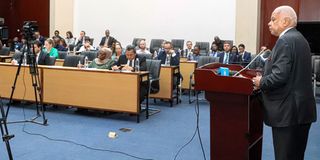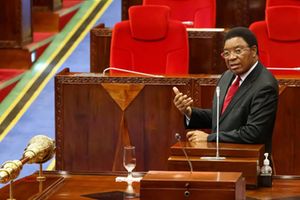Government seeks envoys’ opinions on criminal justice system

Commission for Criminal Justice Reform chairman, Justice Mohamed Chande Othman, speaks during a meeting with various foreign ambassadors and representatives of international organisations in Dar es Salaam yesterday. PHOTO | SUNDAY GEORGE
What you need to know:
- Launched in January of this year with the goal of improving the functioning of 18 criminal justice systems and institutions, the commission is now a committee tasked with seeing that the recommendations are carried out
Dar es Salaam. The Commission for Criminal Justice Reform met with foreign ambassadors and heads of international organisations in Tanzania yesterday to discuss the team’s suggestions to improve access to justice.
The team appointed by President Samia Suluhu Hassan, led by its chairman, Justice Mohammed Othman Chande, kept the envoys updated on what was going on in the country.
“We are currently involving various institutions to receive their advice on implementation, and this is the third week we are doing it,” said the team’s vice chairman, Ambassador Ombeni Sefue.
Mr Sefue said that it will make it possible to know what should be implemented in the short, medium, and long term and who will do what.
He said the meeting with ambassadors and heads of international organisations aims to receive their recommendations.
“I believe every country has its ways to improve policies and laws regarding criminal justice systems,” he said.
Mr Sefue, who is the retired Chief Secretary, explained that the doors were open to build the capacity of the members to ensure that there are any resources and support needed to achieve the implementation of the recommendations.
Speaking at the event, the Comoros ambassador in the country, Dr Ahamada El Badaoui, who is the leader of the foreign ambassadors in Tanzania, said the report is an important lesson to learn from.
“We promise to cooperate with Tanzania in achieving the implementation of this report. The important thing to consider is that our countries maintain the peace they have,” he said.
The commission, which was launched in January this year to reform the performance of 18 criminal justice systems and institutions, has now changed its role and is now a committee in charge of ensuring the recommendations are implemented.
Given the change of roles, the committee, which initially had nine members, added two members, namely retired Prime Minister Joseph Warioba and minister (without portfolio) in the Office of the President, Mr George Mkuchika.
Speaking during the briefing, retired Chief Justice Mohammed Othman Chande said the commission presented recommendations for reforming the police, prisons, and courts.
He said President Hassan changed the role of the commission from making those recommendations to overseeing their implementation.
“After handing over the report, President Hassan did two things, which were to re-appoint the commission to a committee to monitor the implementation of the recommendations and also add two members,” he said.
According to him, the two members have been added to increase the strength of the team.
With their experience in various matters, they are expected to help the team achieve the work at hand.
Regarding the role change, he explained that the committee is currently helping each of the 18 institutions recommended to be reformed to prepare a work plan and strategies to implement the recommendations contained in the report.
According to Justice Chande, the implementation of the recommendations aims to give criminal justice institutions the ability to identify and control crimes before they occur, as is the case now.
“What we want is to have criminal justice institutions that will be able to control crimes before they happen, rather than waiting for them to happen,” he said.
He said each institution should propose its recommendation priorities, which started over four weeks ago, including the one that wanted to have prosecution offices in each district.
“Recently, the Director of Public Prosecutions (DPP) explained that he has established prosecution offices in 50 districts. This is to avoid making the police have the task of investigating, spying, and prosecuting,” he said.





